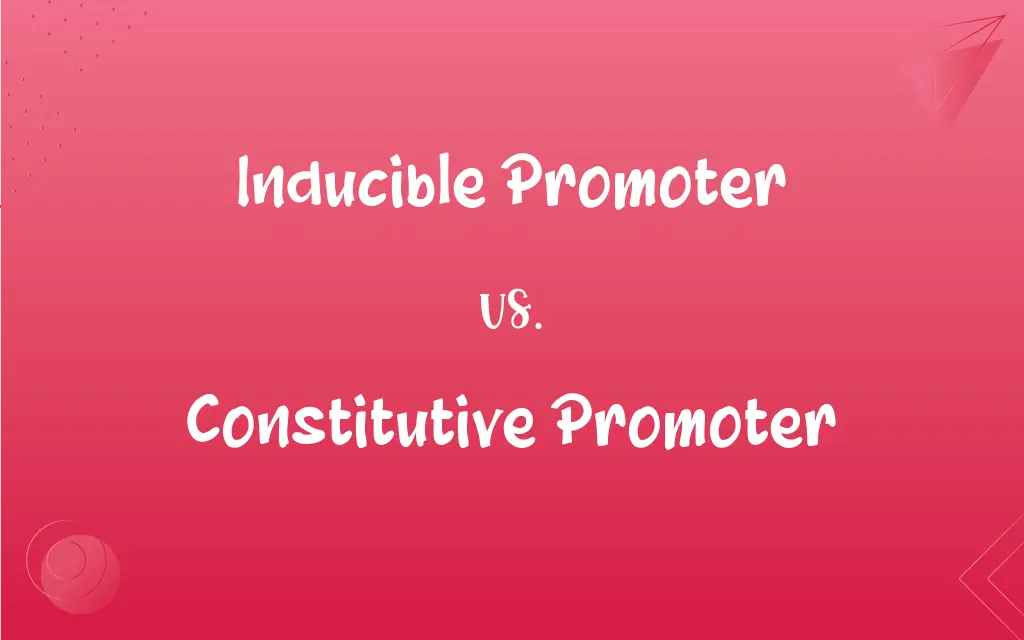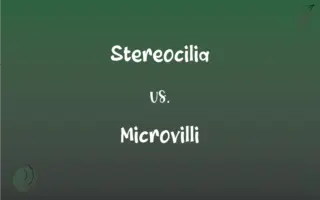Inducible Promoter vs. Constitutive Promoter: What's the Difference?
Edited by Aimie Carlson || By Janet White || Published on March 6, 2024
Inducible Promoter is activated by specific conditions or signals. Constitutive Promoter is constantly active, regardless of conditions.

Key Differences
An inducible promoter is a DNA sequence that initiates transcription in response to an environmental stimulus or specific condition. In contrast, a constitutive promoter is a DNA sequence that maintains a consistent level of transcriptional activity, independent of external conditions.
Inducible promoters are key in adaptive responses, allowing genes to be expressed only when needed. Constitutive promoters, however, drive continuous gene expression, essential for the maintenance of basic cellular functions.
The activity of an inducible promoter can be turned on or off, making it useful for controlled gene expression studies. On the other hand, constitutive promoters are often used in genetic engineering for the constant expression of a desired gene.
Inducible promoters are often used in research to study gene function under specific conditions. Constitutive promoters are more common in basic cellular processes where consistent gene expression is required.
The choice between an inducible and a constitutive promoter depends on the desired control over gene expression. Inducible promoters offer flexibility, while constitutive promoters provide consistency.
ADVERTISEMENT
Comparison Chart
Activation
Activated by specific stimuli.
Always active.
Gene Expression Control
Allows temporal control over gene expression.
Ensures constant gene expression.
Use in Research
Useful for controlled, conditional gene studies.
Used for continuous expression of essential genes.
Cellular Role
Involved in adaptive responses.
Involved in basic cellular functions.
Application in Genetic Study
Ideal for studying gene functions under specific conditions.
Commonly used for stable gene expression studies.
ADVERTISEMENT
Inducible Promoter and Constitutive Promoter Definitions
Inducible Promoter
An adaptable element for controlled gene expression.
Scientists used an inducible promoter to study stress response in cells.
Constitutive Promoter
A promoter used for continuous expression of vital genes.
The constitutive promoter was key in maintaining cell homeostasis.
Inducible Promoter
A promoter that turns on gene expression under specific conditions.
The inducible promoter initiated transcription in the presence of sugar.
Constitutive Promoter
A DNA sequence that constantly initiates transcription.
The constitutive promoter ensured continuous protein production.
Inducible Promoter
A switchable promoter used in conditional gene expression studies.
The inducible promoter allowed researchers to toggle gene activity.
Constitutive Promoter
A promoter that maintains steady gene expression.
The constitutive promoter was used for stable gene expression in the cells.
Inducible Promoter
A DNA sequence responsive to environmental signals.
The inducible promoter activated the gene in response to heat.
Constitutive Promoter
A non-inducible promoter for consistent gene expression.
Researchers used a constitutive promoter for the housekeeping gene.
Inducible Promoter
A regulatory sequence activated by external stimuli.
The inducible promoter was crucial for expressing genes during infection.
Constitutive Promoter
An unregulated promoter for constant transcriptional activity.
The constitutive promoter kept the essential gene always active.
FAQs
Are constitutive promoters used in gene expression studies?
Yes, particularly for genes requiring constant expression.
Is a constitutive promoter always active?
Yes, it maintains constant transcriptional activity.
What is a key application of inducible promoters?
They are crucial in research for studying gene function under specific conditions.
What activates an inducible promoter?
It's activated by specific environmental conditions or stimuli.
Can inducible promoters control gene expression?
Yes, they allow precise control over when a gene is expressed.
What genes are typically controlled by constitutive promoters?
Genes essential for basic cellular functions.
Are inducible promoters useful in therapeutic applications?
Yes, for controlled drug delivery or gene therapy.
Can inducible promoters be used in biotechnology?
Yes, for controlled production of enzymes or pharmaceuticals.
Can an inducible promoter be turned off?
Yes, its activity can be switched off when the stimulus is removed.
How do inducible promoters contribute to adaptive responses?
By enabling gene expression in response to environmental changes.
How do constitutive promoters aid in genetic engineering?
They enable constant expression of introduced genes.
Can inducible promoters be synthetic?
Yes, they can be engineered to respond to specific inducers.
Do constitutive promoters respond to external stimuli?
No, they function independently of external stimuli.
Can constitutive promoters be regulated?
Generally, no, they are designed to be unregulated.
Are constitutive promoters variable in their activity?
No, they provide a uniform level of gene expression.
What makes inducible promoters valuable in experimental research?
Their ability to control gene expression under defined conditions.
Do constitutive promoters have a role in development?
Yes, in maintaining the expression of genes critical for development.
Are inducible promoters specific to certain stimuli?
Yes, each is typically responsive to a specific type of stimulus.
How do constitutive promoters benefit synthetic biology?
They ensure consistent output in synthetic gene circuits.
Do constitutive promoters vary across species?
Yes, but their fundamental characteristic of constant activity remains consistent.
About Author
Written by
Janet WhiteJanet White has been an esteemed writer and blogger for Difference Wiki. Holding a Master's degree in Science and Medical Journalism from the prestigious Boston University, she has consistently demonstrated her expertise and passion for her field. When she's not immersed in her work, Janet relishes her time exercising, delving into a good book, and cherishing moments with friends and family.
Edited by
Aimie CarlsonAimie Carlson, holding a master's degree in English literature, is a fervent English language enthusiast. She lends her writing talents to Difference Wiki, a prominent website that specializes in comparisons, offering readers insightful analyses that both captivate and inform.































































